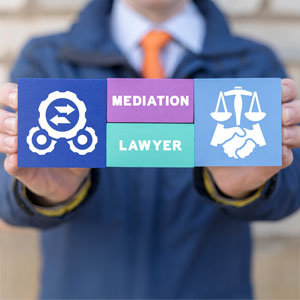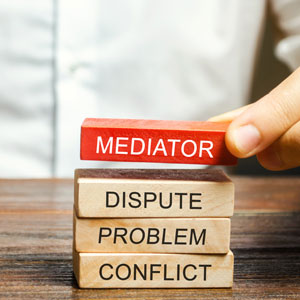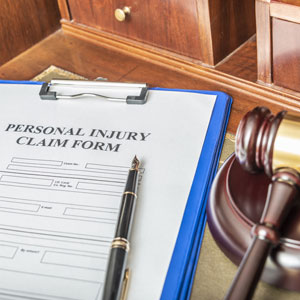
In this article, you can discover… The differences between mediation and litigation. How to prepare for mediation, arbitration, and litigation. Key questions to ask your attorney, mediator, and arbitrator before the process begins. What Are The Differences Between Mediation, Arbitration, And Litigation? It never ceases to amaze me how so many people think arbitration and mediation are the same. This simply is just not the case. Unlike arbitration or litigation, where decisions are made by a judge, jury, or arbitrator, mediation keeps control in the hands of the parties involved. In litigation, a judge or jury applies the law to facts, leaving little control over the outcome. With arbitration, an arbitrator reviews evidence and legal arguments before issuing a binding decision—similar to a judge but with more flexibility. Mediation, on…Read More

In this article, you can discover… How mediation helps protect confidentiality. Whether you can choose your mediator before moving forward. How to set realistic expectations prior to mediation. Does Mediation Provide Confidentiality Protections? In California, mediation is legally protected by confidentiality laws. This means you can have some assurance that you can engage in open discussions without fear that your words will be used against you in court. Under California law, everything said during mediation—including negotiations, mediator discussions, and shared statements—is not admissible in court. If one party attempts to introduce mediation-related communications in a legal proceeding, any participant can object, and the court will typically exclude that evidence. This, in turn, fosters an environment where you can negotiate freely without concerns about damaging your case should your attempt at…Read More

In this article, you can discover… How to objectively examine a dispute’s cause prior to resolution. The benefit of putting yourself in the other person's shoes. Understanding what a fair resolution looks like for both sides. Ask Yourself What Is At The Heart Of This Dispute For Me? Most people get caught up in surface-level grievances without identifying the real issue causing their frustration. Whether in workplace disputes, personal relationships, or legal conflicts, taking the time to pinpoint what truly feels unfair or hurtful can make all the difference. By asking, What is really bothering me?, you can take the first step as you move past vague accusations like You don’t respect me. or You never listen. and address the core problem. Maybe it’s about feeling excluded, undervalued, or unheard.…Read More

In this article, you can discover… How mediation can help resolve contract disputes. Factors to consider when deciding between mediation and litigation. How mediation compares to a trial in terms of speed. What Is The Mediation Process For Contract Disputes Like? When a contract dispute arises, mediation offers a faster, less costly, and more flexible resolution compared to litigation. Instead of leaving the outcome to a judge, mediation allows both parties to negotiate a solution with the help of a neutral third party. With a focus on communication and compromise, mediation is particularly effective for contract disputes—where the core issue is often interpretation and expectation rather than outright wrongdoing. Here’s an overview of how the process works: Initial Agreement To Mediate: Both parties agree to resolve the dispute through mediation…Read More

In this article, you can discover… How to prove professional negligence, and what evidence to gather. Whether expert testimony may be helpful in your case. How an attorney can help you prepare emotionally and practically for your case. What Are Key Elements Required To Prove Professional Negligence In California? In order to prove professional negligence, also known as malpractice in California, four key elements must be presented and established in a case: Duty: The professional owed a duty of care. This is typically established when a client seeks their services, whether it be a doctor treating a patient or an architect designing a building. Breach: The professional must also have failed to meet the standard of care set by their industry. This must be proven by expert testimony from another professional in…Read More

In this article, you can discover… The risks of posting on social media after an injury. Whether direct messages on social media platforms can be used against you. How mindful, consistent posting can help your optics over time. Can Social Media Posts Hurt My Injury Case? Absolutely—yes. Insurance adjusters don’t just casually browse your social media. They have access to specialists whose job is to dig up any online activity that could undermine your claim. Here are some things to know about how exactly they do it: Social Media Scanning Services: Insurance companies hire firms that track online activity, even under variations of your name. Spotting Inconsistencies: If you claim a severe injury but post photos of a vacation or a workout, that evidence can be used against you. Public…Read More

In this article, you can discover… How exaggerating or being inconsistent can seriously damage your claim. Why ignoring adjusters or avoiding communication can derail your case. The importance of evidence, and the types of evidence to gather. Mistake One : Forgetting That Honesty Is Always The Best Policy Maximizing personal injury compensation in your claim can be a fairly difficult thing to do, depending on the specific circumstances you’ve been dealt. For starters, it’s extremely easy to forget that the person you're speaking to—whether it's an insurance adjuster, attorney, or mediator—is documenting everything you say exactly as you say it. In a negotiation where your statements impact the outcome, being consistent and accurate is key. When I say honesty is the best policy, it’s for a simple reason: If you…Read More

In this article, you can discover… Common reasons why insurance companies might deny your claim. How to organize evidence immediately after an accident. The best ways to care for and advocate for yourself after an injury. What Are Common Reasons Insurance Companies Deny Injury Claims? Insurance companies deny injury claims for various reasons, often citing insufficient evidence, lack of coverage, or policy exclusions. Adjusters scrutinize claims to ensure they are legitimate, supported by documentation, and fall within policy terms. Common denial reasons include: Missing or inconsistent details about the accident Missing a police report or witness statements Insufficient medical records linking the injury to the incident Insurance companies are also known to dispute liability, claim pre-existing conditions, or argue that the damages are exaggerated. If policyholders fail to report the…Read More